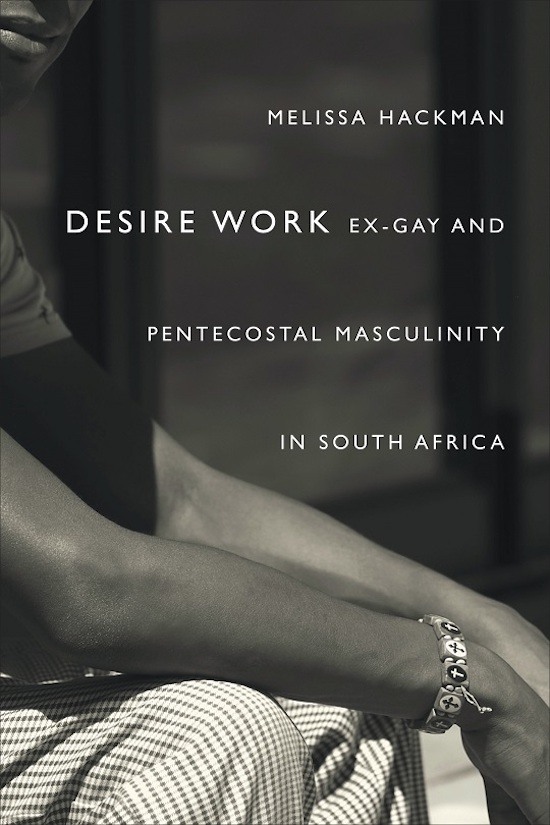Melissa Hackman
Desire Work documents the lives of mostly white, ex-gay Pentecostal men (who believe you can “heal homosexuality through the power of Jesus Christ”) in Cape Town, South Africa during the first decades of democracy. It is an ethnography of how these men navigated their sexual and spiritual lives.

NOTCHES: What drew you to this topic, and what are the questions do you still have?
Melissa Hackman: I was first drawn to this topic upon meeting a young ex-ex-gay man, or formerly ex-gay man, in Boston when I was working on another ethnographic project in 2001. I had never heard of the ex-gay movement, and through an initial search, an entirely new evangelical/Pentecostal world opened up to me. I still have questions about ex-gay ministries in other urban and rural areas in South Africa and the African continent. Many ex-gay ministries are only viable for short periods of time—due to funding and the sexual “falling” of many leaders—so it can be difficult to find, track, and study these individuals. Because homosexuality is illegal in many places in Africa, ex-gay ministries must be very careful, so this also limits ethnographers ability to safely find and study these groups.
NOTCHES: This book is about the history of sex and sexuality, but what other themes does it speak to?
MH: It speaks to the ways in which racism and racial dynamics occur in the multi-racial democracy of South Africa. It also allows us to think about the power and phenomenal growth of Pentecostalism all over Africa.
NOTCHES: How did you research the book?
This book is an ethnography and is based on multi-year participant-observation and interviews from 2004 through 2013. Some of the challenges in the fieldwork came from not being Pentecostal myself and having to navigate the gender and sexual norms at the ex-gay ministry and the church where it was located.
NOTCHES: Whose stories or what topics were left out of your book and why? What would you include had you been able to?
MH: I would have liked to include more stories from men who were still in the ministry when I performed follow-up interviews in 2013, but unfortunately, due to politics and some complicated interpersonal dynamics, it was not possible.
NOTCHES: Did the book shift significantly from the time you first conceptualized it?
The book did change in that I had a hard time at first in trying to explain to others how the men conceptualized their work about themselves and the ways that they believed that God helped them to transform their sexualities and masculinities. I eventually used the idea of desire work as my approach, and hence the name of the book, and the chapters are devoted to explaining different forms of work on the self.
NOTCHES: How did you become interested in the history of sexuality?
MH: I became interested in sexuality and religion beginning in college when I did an internship with the Women’s Ordination Conference. I continued while I was a Divinity School student.
NOTCHES: How do you see your book being most effectively used in the classroom? What would you assign it with?
My book could be used effectively in a number of kinds of classes in the social sciences, gender and sexuality, and religious studies. Methodologically, it can help students to think through the ways in which they can work with those who are different than themselves and who have radically different belief systems than they may have. The book could be taught productively with other books on sexuality and faith such as Christians under Covers: Evangelicals and Sexual Pleasure on the Internet and Saving Sex: Sexuality and Salvation in American Evangelicalism in addition to some important edited volumes on homosexuality and faith in Africa, like Christianity and Controversies over Homosexuality in Contemporary Africa and Public Religion and the Politics of Homosexuality in Africa.
NOTCHES: Why does this history matter today?
MH: This history matters because homophobia is rampant in many places, not just in Africa. We Americans have a Vice President who believes in and advocates for reparative therapy.
 Melissa Hackman is the librarian for Sociology and Development Studies at Emory University’s Robert W. Woodruff Library. She has also taught at a diverse range of schools, including Bates College, Brown University, and Emory University. She has a PhD in Anthropology from the University of California, Santa Cruz.
Melissa Hackman is the librarian for Sociology and Development Studies at Emory University’s Robert W. Woodruff Library. She has also taught at a diverse range of schools, including Bates College, Brown University, and Emory University. She has a PhD in Anthropology from the University of California, Santa Cruz.

NOTCHES: (re)marks on the history of sexuality is licensed under a Creative Commons Attribution-NonCommercial-NoDerivatives 4.0 International License.
Based on a work at www.notchesblog.com.
For permission to publish any NOTCHES post in whole or in part please contact the editors at NotchesBlog@gmail.com




